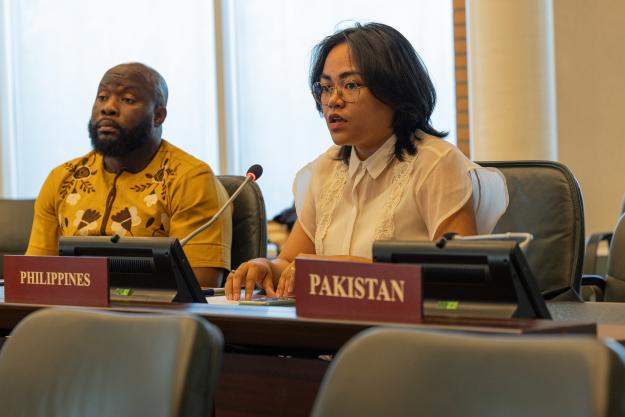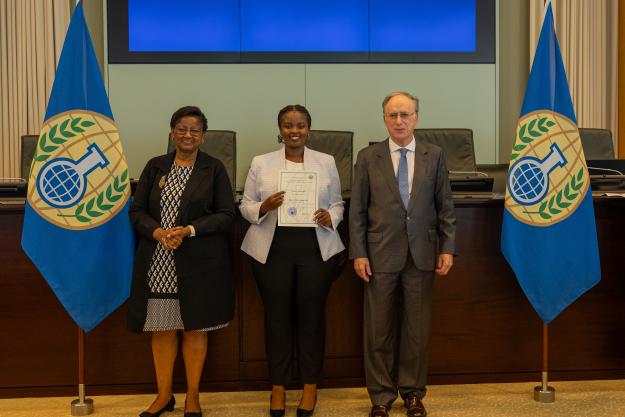Twenty-nine chemists, chemical engineers and technological specialists from 29 countries with developing or transitioning economies participated in the 25th Associate Programme - a flagship programme of the Organisation for the Prohibition of Chemical Weapons (OPCW), which was conducted from 29 July to 26 September 2024. Part of the programme took place at the OPCW main building and the OPCW Centre for Chemistry and Technology in The Hague, The Netherlands, while other segments were delivered at universities and chemical industry facilities across Africa, Asia and Europe.
In his remarks at the closing ceremony, the Director-General of the OPCW, Ambassador Fernando Arias highlighted the significance of the programme, noting "Our goal through this programme is to build a network of professionals who can provide direct, practical assistance to their National Authorities in implementing the Convention."
Director-General Arias stressed that through the Programme, the participants are better equipped to address chemical weapon threats in their respective countries and ensure chemistry is used solely for the benefit of humanity. He mentioned, "You have gained practical training that will help you implement the Convention in your countries, while preparing you to work safely and effectively in a modern chemical industry environment. […] Beyond contributing to economic and technological development, the expertise that you have acquired can also be applied to improve chemical safety and security standards."
This year's programme comprises practical and theoretical modules with different segments. In the Induction Segment, a series of featured lectures from relevant stakeholders related to the CWC, such as the International Chemical Trade Association, were provided. The Intermediate Segment offered interactive table-top exercises on OPCW's inspection process. Participants also visited the OPCW's Centre for Chemistry and Technology (CCT) and had an in-depth understanding of its work. The three-week University Segment was held at the University of Surrey, UK, with skill development trainings on chemical plant operation, company environment simulations, as well as problem-solving exercises. In the Industry Segment, participants engaged in practical, hands-on training at 15 plant sites from 11 member states, offering participants real-world industry exposure to different operational environments.
"This year, participants from Africa made up almost a third of the participants, reflecting our region's strong presence. Throughout the various segments of the programme-academy, industry, verification, inspectorate, science and technology-we have engaged deeply, and we are ready to apply what we have learned in our diverse roles." said Abdalla Abdulrahman Khalil Ali, Associate Programme participant from Sudan.
Tiffany Joan Del Rosario from the Philippines stated: "The Associate Programme was quite a transformative experience that went above and beyond our collective initial expectations. As we go back to our respective lives and responsibilities, I hope that the spark ignited here will turn into a flame that guides the pursuit of international cooperation under mutual respect and understanding."

"Our region faces many challenges. The full implementation of the CWC is especially important for our region to promote security and stability. I would be privileged to use my knowledge to contribute to a life free of chemical weapons in my country and the region, and to ensure that chemistry is used only for peaceful purposes," said participant Gayane Vardanyan from Armenia.
Leidy Jhojana Bobadilla Arias from Colombia noted that "This programme has not only allowed us to deepen our technical knowledge and understanding of the mechanisms that protect humanity from chemical weapons threat, it has also facilitated the creation of links between countries and regions, promoting cultural and professional exchange that strengthens the international fabric of cooperation."
By October 2024, the OPCW Associate Programme has 643 alumni from 123 countries. The pool of Associates has been further deepened during the past two years, with additional participants from Mauritania (2023) and Guatemala (2024).

Background
The OPCW Associate Programme is designed to enhance participants' knowledge of the Chemical Weapons Convention and to develop the skills necessary to operate in a modern chemistry environment. The course prepares participants for technical assignments within the OPCW Technical Secretariat and positions related to the implementation of the Convention in their home countries. The programme is conducted annually over nine weeks and is comprised of practical and theoretical modules.
The main objectives of the programme are:
to facilitate national implementation of the Convention related to the chemical industry;
to offer training in areas related to chemistry and chemical engineering to personnel from industry, universities, and the government;
to facilitate trade in these areas through adoption of good practices in chemical industry;
to broaden the talent pool for positions related to industry in National Authorities, institutions, and economic positions in Member States as well as in the Secretariat.
As the implementing body for the Chemical Weapons Convention, the OPCW, with its 193 Member States, oversees the global endeavour to permanently eliminate chemical weapons. Since the Convention's entry into force in 1997, it is the most successful disarmament treaty eliminating an entire class of weapons of mass destruction.
On 7 July 2023, the OPCW verified that all chemical weapons stockpiles declared by the 193 States Parties to the Chemical Weapons Convention since 1997 - totalling 72,304 metric tonnes of chemical agents - have been irreversibly destroyed under the OPCW's strict verification regime.
For its extensive efforts in eliminating chemical weapons, the OPCW received the 2013 Nobel Peace Prize.






